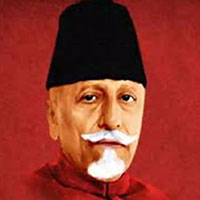Abul Kalam Azad
Maulana Abul Kalam Ghulam Muhiyuddin Ahmed bin Khairuddin Al-Hussaini Azad was an Indian independence activist, Islamic theologian, writer and a senior leader of the Indian National Congress. Following India’s independence, he became the First Minister of Education in the Indian government.
Maulana Abul Kalam Azad was one of the foremost leaders of Indian freedom struggle. He was also a renowned scholar, and poet. Maulana Abul Kalam Azad was well versed in many languages viz. Arabic, English, Urdu, Hindi, Persian and Bengali. Maulana Abul Kalam Azad was a brilliand debater.
Maulana Abul Kalam Azad’sf orefathers came from Herat, a city Afghanistan in Babar’s days. Azad was a descendent of a lineage of learned Muslim scholars. His mother was an Arab and the daughter of Sheikh Mohammad Zaher Watri and his father, Maulana Khairuddin, was a Bengali Muslim of Afghan origins. Khairuddin left India during tile Sepoy Mutiny and proceeded to Mecca and settled there. He came back to Calcutta with his family in 1890.
Because of his orthodox family background Azad was taught at home, first by his father and later by appointed teachers who were eminent in their respective fields.
Azad was trained and educated to become a clergyman, He wrote many works, reinterpreting the holy Quran. He developed interest in the pan¬ Islamic doctrines of Jamaluddin Afghani and the Aligarh thought of Sir Syed Ahmed Khan. Imbued with the pan-Islamic spirit, he visited Afghanistan, Iraq, Egypt, Syria and Turkey. In Iraq he met the exiled revolutionaries who were fighting to establish a constitutional government in Iran. In Egypt he met Shaikh Muhammad Abduh and Saeed Pasha and other revolutionary activists of the Arab world. He had a first hand knowledge of the ideals and spirit of the young Turks in Constantinople. All these contacts metamorphosed him into a nationalist revolutionary.
On his return from abroad; Azad met two leading revolutionaries of Bengal- Aurobinto Ghosh and Sri Shyam Shundar Chakravarty,-and joined the revolutionary movement against British rule. Azad found that the revolutionary activities were restricted to Bengal and Bihar. Within two years, Maulana Abul Kalam Azad helped set up secret revolutionary centers all over north India and Bombay. During that time most of his revolutionaries were anti-Muslim because they felt that the British government was using the Muslim community against India’s freedom struggle. Maulana Abul Kalam Azad tried to convince his colleagues to shed their hostility towards Muslims.
In 1912, Maulana Abul Kalam Azad started a weekly journal in Urdu called Al-Hilal to increase the revolutionary recruits amongst the Muslims. Al-Hilal played an important role in forging Hindu-Muslim unity after the bad blood created between the two communities in the aftermath of Morley-Minto reforms. Al-Hilal became a revolutionary mouthpiece ventilating extremist views. ‘The government regarded Al- Hilal as propagator of secessionist views and banned it in 1914. Maulana Abul Kalam Azad then started another weekly called Al-Balagh with the same mission of propagating Indian nationalism and revolutionary ideas based on Hindu-Muslim unity. In 1916, the government banned this paper too and expelled Maulana Abul Kalam Azad from Calcutta and internet him at Ranchi from where he was released after the First World War 1920.
After his release, Azad roused the Muslim community through the Khilafat Movement. The aim of the movement was to re-instate the Khalifa as the head of British captured Turkey. Maulana Abul Kalam Azad supporded Non-Cooperation Movement started by Gandhiji and entered Indian National Congress in 1920. He was elected as the president of the special session of the Congress in Delhi (1923). Maulana Azad was again arrested in 1930 for violation of the salt laws as part of Gandhiji’s Salt Satyagraha. He was put in Meerut jail for a year and a half. Maulana Abul Kalam Azad became the president of Congress in 1940 and remained in the post till 1946. He was a staunch opponent of partition and supported a confederation of autonomous provinces with their own constitutions but common defence and economy. Partition hurt him great(y ant shattered his dream of an unified nation where Hindus and Muslims can co-exist and prosper together. After the war Azad was one of the Indian leaders who negotiated for Indian independence with the British. He tirelessly advocated for a single India that would embrace both Hindus and Muslims while strongly opposing the partition of British India into independent India and Pakistan. He later blamed both Congress Party leaders and Mohammed Ali Jinnah, the founder of Pakistan, for the ultimate division of the subcontinent.
Maulana Abul Kalam Azad served as the Minister of Education (the first education minister in independent India) in Pandit Jawaharlal Nehru’s cabinet from 1947 to 1958.

Abul Kalam Azad
Date of Birth: 11 Nov 1958
Birth Place: Mecca, Saudi Arabia
Proffession: Former Minister of Education of India
Nationality: India
Death: 22 February 1958, Delhi


